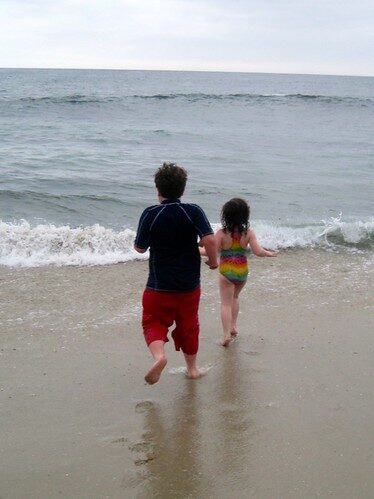Why parents of autistic kids need to be cautious and thoughtful about the therapies they consider for their children.
Tag: development
All humans deserve to be able to do energy budgeting in ways that make sense for us, and I hope to see the day when support for autistic people toward this end is considered a matter of basic ethics and decency.
Photo © Shannon Des Roches Rosa [image: two white kids in bathing suits running on a beach towards some waves.] Elizabeth Torres is Director and Principal Investigator at the New Jersey Autism Center of Excellence, and a researcher at Rutgers University, where her lab “develops new methods for precision medicine and mobile health.” We spoke with Dr. Torres about her work on autism’s motor and movement underpinnings, and why research in this area could lead to autistic people getting greatly improved and highly person-specific accommodations and supports, and why autism research is so rarely truly evidence-based. Why is understanding neuromotor-based factors in autism so important? Elizabeth Torres: As you know, autism is currently defined by observation. Think about a continuum from zero to ten, where at zero you have opinion, and at ten you have hardcore rigorous science, mathematically based. And somewhere in between, you have pseudoscience and soft science…
Trust that your autistic child can thrive alongside others, whether with spoken words, or not. Do not be afraid to tell the next salesperson, arriving with a false horror story about how your child will never achieve anything without their ‘Patented Treatment,’ that you have more confidence in your child than they do.
Emily Willingham www.emilywillinghamphd.com www.forbes.com/sites/emilywillingham Let’s start with the headlines blaring the news about a recent autism study. They almost invariably use the phrase “grow out of autism,” even though the study itself does not use that phrase or even reference “grow” except to talk about head circumference. Instead, the authors of the report, published in The Journal of Child Psychology and Psychiatry, use the term “optimal outcomes” to describe what they detected in a group of 34 people who were diagnosed as autistic when they were under age 5. As the study authors themselves state, this idea that autistic people might show reduced deficits to the point of losing a diagnosis is not new. In fact, first author Deborah Fein and colleagues cite studies identifying frequencies of “optimal outcomes” as high as 37% among autistic people. The lingering open questions relate to whether or not the autistic people in these…
Devon Koren Asdell community.advanceweb.com/blogs/ot_9/default.aspx Eleven years ago, as I lounged in my mother’s apartment at the tender age of twenty, overwhelmed by the heat of the summer combined with my final trimester of pregnancy, I finally settled on a name for the creature who kept poking her tiny feet into my ribcage, the creature who was poised at any moment to completely and irrevocably change my life. I decided on a name derived from the Irish language — “Aisling,” which meant “Dream,” and “Stoirm,” which meant “Storm.” A Dream Storm. At that moment, I had no idea how completely that name would end up describing my beautiful, blond-haired daughter, who would spend much of her time lost in the dreams inside her head, and who would also grow to rage against the confusing world around her. I did not realize that the child in my womb would be diagnosed…



